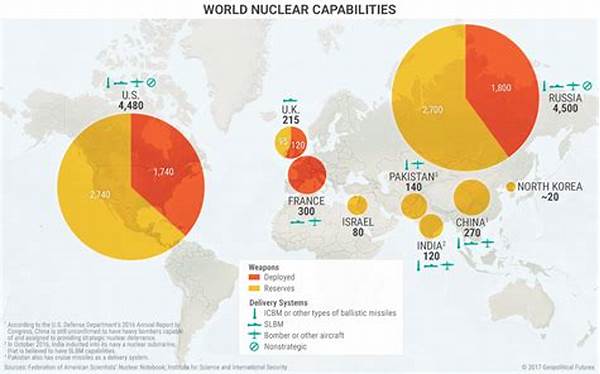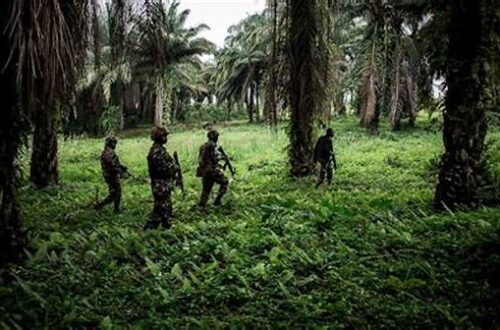The topic of nuclear armaments remains one of the most pressing issues on the global stage, intricately affecting the balance of power between nations. With technological advancements and the persistence of global tensions, understanding the geopolitical impacts of nuclear armaments is crucial. This article aims to explore these multifaceted effects, examining how nuclear capabilities shape international relations, political dynamics, and global peace.
Nuclear Armaments and Global Power Dynamics
The geopolitical impacts of nuclear armaments are profoundly evident in the global power dynamics that shape international order. Firstly, nuclear-armed nations possess a heightened level of influence, as their weapons serve as a deterrent against potential aggressors. This status often grants them preferential treatment and a pivotal role in international organizations. The power balance shifts notably towards nations with advanced nuclear capabilities, overshadowing non-nuclear states in geopolitical discussions.
Moreover, the existence of nuclear weapons leads to complex alliances and strategic partnerships. Nations often align themselves with nuclear powers to ensure their security, significantly affecting global alliances. This centrality of nuclear strategy in defense policies underlines the geopolitical impacts of nuclear armaments, as countries are compelled to either pursue their own nuclear programs or forge alliances with nuclear powers to ensure national security.
Lastly, nuclear armaments contribute to an arms race in various regions, escalating tensions and inhibiting peaceful resolutions of conflicts. The geopolitical impacts of nuclear armaments often incite fear and mistrust among nations, increasing the likelihood of misunderstandings that can lead to confrontation. This dynamic perpetuates a cycle of rivalry, where nations continually seek to enhance their nuclear capabilities, posing challenges for global disarmament efforts.
The Deterrence Factor
1. Strategic Deterrence: The geopolitical impacts of nuclear armaments include the establishment of deterrent strategies, wherein nations maintain nuclear arsenals to discourage potential attacks. This strategy plays a critical role in maintaining a precarious peace among nuclear states.
2. Power Projection: Nations with nuclear capabilities often wield considerable power on the international stage, influencing geopolitical negotiations and asserting their stance on critical global issues.
3. Diplomatic Leverage: Nuclear armaments provide countries with significant diplomatic leverage, altering the balance of power in negotiations and often granting nuclear states a dominant voice in international forums.
4. Alliance Formation: Non-nuclear states may seek alliances with nuclear-armed nations, enhancing regional security but also contributing to a polarized world order dominated by nuclear capabilities.
5. Conflict Escalation: The presence of nuclear weapons can escalate conflicts, as the threat of nuclear engagement adds complexity to international disputes, illustrating the significant geopolitical impacts of nuclear armaments.
Regional Instabilities and Nuclear Strategies
The geopolitical impacts of nuclear armaments are particularly observable in regions plagued by historical conflicts and ongoing political tensions. In regions like South Asia and the Korean Peninsula, nuclear weapons play a central role in national security doctrines. States in these volatile areas often depend on nuclear capabilities to counteract perceived external threats, intensifying regional instabilities.
These dynamics perpetuate a constant state of alert, complicating diplomatic efforts and peace negotiations. Nuclear strategies often prioritize military readiness over diplomatic engagement, further embedding conflict rather than resolving it. The geopolitical impacts of nuclear armaments thus include a destabilizing effect on already fragile regions, which poses challenges for regional and global security initiatives aimed at reducing nuclear proliferation.
Arms Control and Disarmament Challenges
Efforts to manage the geopolitical impacts of nuclear armaments often focus on arms control and disarmament initiatives. However, these efforts encounter significant hurdles due to geopolitical rivalries and distrust among nuclear-armed states. The lack of transparency and verification mechanisms complicates the implementation of arms reduction treaties.
1. Complex Verification: The geopolitical impacts of nuclear armaments are magnified by the difficulty in verifying disarmament, undermining trust among nations and hindering global disarmament efforts.
2. Geopolitical Rivalries: Existing geopolitical tensions among nuclear-armed nations often derail disarmament negotiations, as states are reluctant to diminish their military capabilities.
3. Sovereign Security Concerns: Nations prioritize their security, viewing nuclear disarmament as potentially weakening their national defense posture.
4. Technological Advancements: Rapid advancements in nuclear technology challenge existing arms control frameworks, requiring constant adaptation and negotiation.
5. Global Leadership: Effective global leadership is crucial in advancing arms control treaties, necessitating the engagement and commitment of major nuclear powers.
6. Resource Allocation: The allocation of significant resources towards maintaining and modernizing nuclear arsenals demonstrates the prioritization of nuclear capabilities over disarmament.
7. Non-Proliferation Challenges: Preventing the spread of nuclear weapons remains a formidable task, with geopolitical impacts affecting the effectiveness of non-proliferation treaties.
8. Strategic Ambiguities: The lack of clear strategic goals among nuclear powers complicates disarmament discussions and agreements.
9. Nuclear Doctrine Variability: Diverse nuclear doctrines among nations lead to disparities in disarmament priorities and strategies.
10. Institutional Frameworks: Strengthening international institutions dedicated to disarmament is essential in addressing the geopolitical impacts of nuclear armaments effectively.
The Role of International Organizations
International organizations play a pivotal role in mitigating the geopolitical impacts of nuclear armaments through diplomacy, mediation, and policy formulation. Institutions such as the United Nations and the International Atomic Energy Agency (IAEA) facilitate dialogue and monitor compliance with nuclear treaties. However, their ability to enforce compliance remains limited, particularly when dealing with powerful nuclear states.
The negotiation and implementation of arms control agreements often require the cooperation and willingness of nuclear powers to engage genuinely in disarmament initiatives. The geopolitical impacts of nuclear armaments underscore the importance of multilateral efforts and international collaboration to prevent nuclear proliferation. Nevertheless, institutional constraints and geopolitical rivalries among member states frequently impede progress, necessitating sustained diplomatic efforts to achieve meaningful disarmament outcomes.
Prospects for Nuclear Disarmament
The journey towards comprehensive nuclear disarmament faces substantial challenges, yet it remains a critical endeavor in reducing the geopolitical impacts of nuclear armaments. Achieving progress necessitates an inclusive and cooperative approach, engaging both nuclear and non-nuclear states in constructive dialogue. Strengthening verification mechanisms and building trust through transparency are vital components in advancing disarmament agendas.
Furthermore, the role of civil society and non-governmental organizations in advocating for nuclear disarmament cannot be understated. These entities raise awareness and generate public support for disarmament initiatives, urging governments to prioritize the reduction of nuclear arsenals. Despite the daunting obstacles, fostering an international climate conducive to disarmament remains essential for mitigating the significant geopolitical impacts of nuclear armaments.
Summary
In conclusion, the geopolitical impacts of nuclear armaments are multifaceted and deeply rooted in the complexities of international relations. Nuclear capabilities confer strategic advantages upon nations, influencing global power dynamics and fostering a paradigm of deterrence. However, the presence of nuclear weapons also exacerbates regional instabilities, complicates diplomatic engagements, and challenges global disarmament efforts.
To address these impacts, robust international collaboration and commitment to arms control initiatives are essential. The geopolitical impacts of nuclear armaments necessitate a balanced approach that encompasses regional security concerns, technological advancements, and the fostering of dialogue among nuclear and non-nuclear states. Ultimately, pursuing a world free of nuclear weapons remains a formidable yet necessary aspiration for ensuring global peace and stability.





